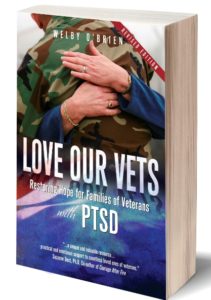Are you ever afraid to say things to your vet, wondering what wild card is in place today that will set him (or her) off? Walking on eggshells and weighing every word has come to be the norm for many of us. Even though this is typical, it is so discouraging, frustrating, scary, and lonely too. Not a healthy way to live – for us or our vets.
Those of us who live with veterans who have PTSD also over time acquire our own coping mechanisms. We too must survive. Unfortunately the patterns we develop are not always the best. One vet wife shared a recent incident with our group that resonated with all of us. She had been out shopping that day and wasn’t quite as skillful behind the wheel as she would have liked. Smash! Oops. Amazing how that light pole just jumped out at her car and attacked it! Needless to say, she dreaded going home and telling her husband.
In panic mode all the way home she visualized scores of possible scenarios and frantically rehearsed her lines. Her heart was beating even more now than when she bumped the pole. She was sweating like a pig and shaking in fear. How would he react? How could she word things so he would not explode all over her?
Then her cleverness kicked in. Hmmm…maybe she could stop somewhere and buy a flamingly sexy negligee to distract him. And walk in carrying a big gooey pizza. Ah ha! That might just do it. Well, at least until she broke the news. Or maybe she could just wait it out and bide her time until he saw the car. Maybe he would never notice. No such luck. Perhaps she should just go straight to the airport…
All of us can relate. Even normal couples go through things like this. However, as I say in my book Love Our Vets: Restoring Hope for Families of Veterans with PTSD , PTSD has a supercharging effect which magnifies situations to catastrophic proportions. What might be a normal conflict or skirmish for others packs nuclear potential with PTSD.
We cannot fix or change them. We cannot return to pre-PTSD days. Nor can we always avoid problems. But, we CAN become mindful of ourselves and our responses. And we CAN sort through our words in advance. And we CAN remember that it is their PTSD. And we CAN remind ourselves that they will calm down eventually. And we CAN keep our sense of humor. (Seeing things more lightheartedly helps us and our vets navigate more smoothly through the rough waters.) And we CAN remember that it is not our job to keep them happy all the time.
Most importantly, we CAN speak graciously, not out of fear but from inner strength which I have found comes with time.
Well, our friend eventually got home, took a nice hot lavender bubble bath to calm her nerves, and joined her husband in front of the TV with a glass of wine. She knew her window of speaking opportunity was about 3 seconds, and the first few words would set the stage for how this would play out. So she started by humbly and cutely reminding him of how much he loves her even when she is not perfect. Instantly he blurted, “Okay what have you done now?!” She managed to tell him and he did get ticked off. But not violent. She continued to talk calmly and tried to present the options, including her taking responsibility for insurance details and repairs.
After all was said and done, they managed to survive…and so did the car. Whew! (sigh of relief) But once again we are reminded of how crippling our fear can be when we are afraid to speak to our vets. The more we remember and focus on what we CAN do, the stronger and more gracious we will grow.
.




